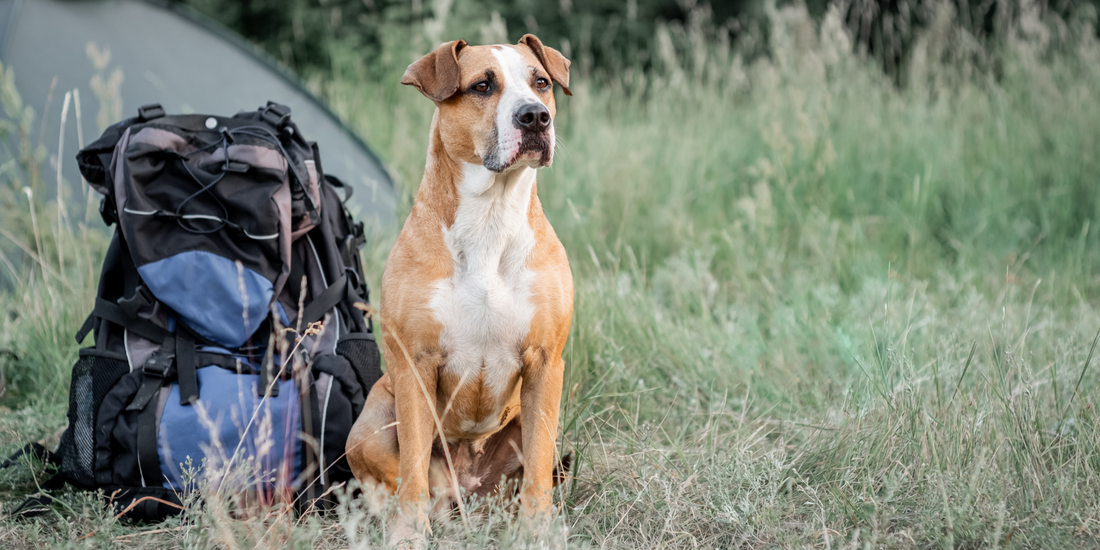The most popular season to go camping is summer (though it is an activity you can do all year round, if you're brave enough). Camping is a great way to escape our busy lives and explore the world around us. Dogs also love exploring the world, so why not take them along? Here are three reasons to go camping with dogs and dog camping tips for a successful trip (as long as they have the appropriate personality and energy level for this type of activity).
Reasons To Camp With Your Dog
1. A Trip You Can Bring Your Dog Along On
Vacations are great, but leaving behind your dog isn't. Camping is the best of both worlds - you get a break from your everyday life and your dog can come along with you. Dogs make for pretty good company and having the extra companionship is a nice perk.
2. Exercise And Enrichment
It's a well-known fact that dogs need lots of exercise and enrichment to keep them physically and mentally healthy. Some benefits include maintaining a healthy weight for your dog, as well as minimizing and preventing destructive behaviors and boredom. Camping is great way to get your dog moving and all those new scents provide enrichment and mental stimulation.
3. An Opportunity For Training
You can train your dog anywhere, but the great outdoors provides a unique training opportunity. For safety reasons, you'll want your dog to be at least somewhat trained when you go camping together. But that doesn't mean you can't brush up on old skills. For example, all the new sights and smells, as well as the unfamiliar grounds, set the perfect stage for some obedience training.
Tips For Camping With Your Dog
1. Follow The Rules Of The Campground
If you like to embark on journeys without a plan and go where the wind takes you, camping with your dog may not be for you. This is because you'll need to prepare ahead of time and find a campground that allows pets. And following the rules doesn't stop once you get to the dog-friendly site. Make sure you abide by the site's specific regulations, which often include leashing your dog at all times and cleaning up after your pet.
Pro Tip: Some campsites and parks have rules that change by the season (like allowing dogs in the off-season) so make sure to check online or call the grounds.
2. Pack Properly
You'll want to bring everything you need, but also pack light. The essentials are nonnegotiable, from food and water to medication and first aid supplies. Check the weather before you embark so you can be prepared. If it's going to be hot, bring extra water to avoid dehydration for your dog. If it'll be cold, pack extra layers to keep your dog warm. You can also pack some nonessentials if they fit, such as toys for your dog to help ease any anxiety he or she may experience.
Pro Tip: Don't let your dog drink from standing water or salt water. Bring along a collapsible water bowl so you can give them clean water.
3. Be Prepared For Emergencies
Emergencies can happen at any time and you won't wait for you to be done with your camping trip. Because of this, it's a good idea to plan ahead and bring a first aid kit. The ASPCA recommends kits include absorbent gauze pads, adhesive tape, antibiotic ointment, cotton balls, hydrogen peroxide, ice packs, disposable gloves, tweezers, scissors, and more.
It's also a good idea to keep a copy of your dog's medical and vaccination records on hand. You can put a paper copy in your first-aid kit or you can keep a digital copy on your phone. Either way, you'll have easy access in case your dog gets sick or injured and needs to go to a local vet.
Pro Tip: When exploring the great outdoors, it's best to make sure you only take your dog if he or she is on tick medication to avoid contracting Lyme disease.
4. Protect Paws
Your dog's paws are durable but not immune to damage or injury. Dog booties or paw wax can protect against cold snow in the winter, hot surfaces in the summer and other hazards lying on the ground.
Pro Tip: Just like hiking boots need to be broken in before we where them, so do dog booties. Have your dog wear them (and any other gear they may wear) before your trip.
5. Keep your Dog On A Leash
Even if there are no leash-laws at the campground you're visiting, it's an extra safety precaution to keep your dog leashed. You never know if other dogs are reactive, what wildlife may be around you or when something unexpectedly triggers your dog to run off. In case you do become separated, make sure your dog is microchipped or wearing identification tags and that the contact information is up-to-date.

